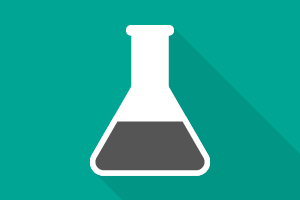Classroom Resources: Molecules & Bonding
Filter by:
26 – 35 of 35 Classroom Resources
-

Covalent Bonding, Naming Compounds, Molecular Formula, Lewis Structures | High School
Activity: Molecular Compound Dice Mark as Favorite (99 Favorites)
In this activity students will use dice and element cards to name molecular compounds and draw their Lewis dot structures.
-

Molecular Formula, Atomic Mass, Molar Mass | High School
Activity: Molecule Building Tournament Mark as Favorite (13 Favorites)
In this activity, students determine molecular formulas given formula masses and a limited number of atoms.
-

Molecular Formula, History, Covalent Bonding, Molecular Structure, Physical Properties, Chemical Properties | High School
Activity: Molecule of the Week Mark as Favorite (41 Favorites)
In this activity, students research and present a molecule they find relevant to real life, either in the past or present. They must submit notes to the teacher the day before they present their findings in five to 10 minutes to their chemistry class.
-

Ionic Bonding, Naming Compounds, Molecular Formula, Ions, Ionic Radius, Solubility, Melting Point, Physical Properties | High School
Activity: My Name is Bond, Ionic Bond Mark as Favorite (79 Favorites)
In this lesson, students will demonstrate their knowledge of ionic bond strength using a “brackets” activity. Pairs of students start the activity playing a game of “Ionic Compound War” to build eight compounds. Then then transfer the compounds to a “bracket” and use their knowledge of ionic bonding, along with a solubility chart, to predict the strongest and weakest bond between four pairs of ionic substances.
-

Molecular Formula, History, Functional Groups, Covalent Bonding, Molecular Structure | High School
Activity: Napoleon's Buttons Writing Assignment Mark as Favorite (27 Favorites)
In this activity, students read Penny Le Couteur and Jay Burreson’s book Napoleon’s Buttons: How 17 Molecules Changed History. They discuss the book in class and complete a written assignment based on the chemistry and history highlighted in the book.
-

Mixtures, Solute & Solvent, Intermolecular Forces, Intermolecular Forces, Molecular Formula, Molecular Structure, Polymers, Electromagnetic Spectrum | Middle School, High School
Video: What is Paint? Video Mark as Favorite (18 Favorites)
This video investigates the composition of paint, while analyzing the fundamental chemistry principles of its main components. Students will learn about the differences between three common paint types, water colors, oil-based and acrylic paint as well as the chemistry of each.
-

Molecular Formula, Periodic Table, Ionic Bonding, Covalent Bonding | High School
Activity: Bondy (Rummy) Mark as Favorite (36 Favorites)
In this activity, students play a game in which they use element cards to form compounds.
-

Molecular Formula, Stoichiometry, Law of Definite Proportions, Dimensional Analysis, Mole Concept, Classification of Reactions | High School
Lab: Finding the Formula of Magnesium Oxide Mark as Favorite (25 Favorites)
In this lab, students will recognize that oxygen has mass and that heating can involve and increase in mass as an element reacts to become an oxide
-

Molecular Formula, Ionic Bonding, Covalent Bonding | High School
Lab: Lego Modeling of Compounds Mark as Favorite (42 Favorites)
In this lab, students build Lego models of ionic and covalent compounds.
-

Photosynthesis, Conservation of Mass, Balancing Equations, Chemical Change, Reversible Reactions, Molecular Formula, Interdisciplinary, Chemical Change, Conservation of Mass | Middle School
Lesson Plan: The Building Blocks of Photosynthesis Mark as Favorite (3 Favorites)
In this lesson, students will use colored blocks to represent the elements in photosynthesis and illustrate how they are broken down and reassembled to create glucose.